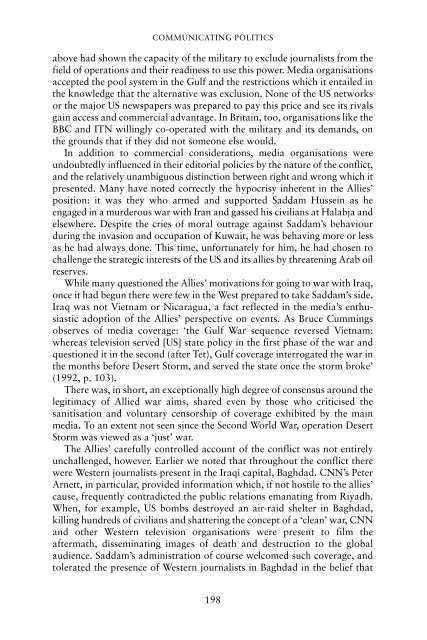20130412164339753295_book_an-introduction-to-political-communication
20130412164339753295_book_an-introduction-to-political-communication
20130412164339753295_book_an-introduction-to-political-communication
Create successful ePaper yourself
Turn your PDF publications into a flip-book with our unique Google optimized e-Paper software.
COMMUNICATING POLITICS<br />
above had shown the capacity of the military <strong>to</strong> exclude journalists from the<br />
field of operations <strong>an</strong>d their readiness <strong>to</strong> use this power. Media org<strong>an</strong>isations<br />
accepted the pool system in the Gulf <strong>an</strong>d the restrictions which it entailed in<br />
the knowledge that the alternative was exclusion. None of the US networks<br />
or the major US newspapers was prepared <strong>to</strong> pay this price <strong>an</strong>d see its rivals<br />
gain access <strong>an</strong>d commercial adv<strong>an</strong>tage. In Britain, <strong>to</strong>o, org<strong>an</strong>isations like the<br />
BBC <strong>an</strong>d ITN willingly co-operated with the military <strong>an</strong>d its dem<strong>an</strong>ds, on<br />
the grounds that if they did not someone else would.<br />
In addition <strong>to</strong> commercial considerations, media org<strong>an</strong>isations were<br />
undoubtedly influenced in their edi<strong>to</strong>rial policies by the nature of the conflict,<br />
<strong>an</strong>d the relatively unambiguous distinction between right <strong>an</strong>d wrong which it<br />
presented. M<strong>an</strong>y have noted correctly the hypocrisy inherent in the Allies’<br />
position: it was they who armed <strong>an</strong>d supported Saddam Hussein as he<br />
engaged in a murderous war with Ir<strong>an</strong> <strong>an</strong>d gassed his civili<strong>an</strong>s at Halabja <strong>an</strong>d<br />
elsewhere. Despite the cries of moral outrage against Saddam’s behaviour<br />
during the invasion <strong>an</strong>d occupation of Kuwait, he was behaving more or less<br />
as he had always done. This time, unfortunately for him, he had chosen <strong>to</strong><br />
challenge the strategic interests of the US <strong>an</strong>d its allies by threatening Arab oil<br />
reserves.<br />
While m<strong>an</strong>y questioned the Allies’ motivations for going <strong>to</strong> war with Iraq,<br />
once it had begun there were few in the West prepared <strong>to</strong> take Saddam’s side.<br />
Iraq was not Vietnam or Nicaragua, a fact reflected in the media’s enthusiastic<br />
adoption of the Allies’ perspective on events. As Bruce Cummings<br />
observes of media coverage: ‘the Gulf War sequence reversed Vietnam:<br />
whereas television served [US] state policy in the first phase of the war <strong>an</strong>d<br />
questioned it in the second (after Tet), Gulf coverage interrogated the war in<br />
the months before Desert S<strong>to</strong>rm, <strong>an</strong>d served the state once the s<strong>to</strong>rm broke’<br />
(1992, p. 103).<br />
There was, in short, <strong>an</strong> exceptionally high degree of consensus around the<br />
legitimacy of Allied war aims, shared even by those who criticised the<br />
s<strong>an</strong>itisation <strong>an</strong>d voluntary censorship of coverage exhibited by the main<br />
media. To <strong>an</strong> extent not seen since the Second World War, operation Desert<br />
S<strong>to</strong>rm was viewed as a ‘just’ war.<br />
The Allies’ carefully controlled account of the conflict was not entirely<br />
unchallenged, however. Earlier we noted that throughout the conflict there<br />
were Western journalists present in the Iraqi capital, Baghdad. CNN’s Peter<br />
Arnett, in particular, provided information which, if not hostile <strong>to</strong> the allies’<br />
cause, frequently contradicted the public relations em<strong>an</strong>ating from Riyadh.<br />
When, for example, US bombs destroyed <strong>an</strong> air-raid shelter in Baghdad,<br />
killing hundreds of civili<strong>an</strong>s <strong>an</strong>d shattering the concept of a ‘cle<strong>an</strong>’ war, CNN<br />
<strong>an</strong>d other Western television org<strong>an</strong>isations were present <strong>to</strong> film the<br />
aftermath, disseminating images of death <strong>an</strong>d destruction <strong>to</strong> the global<br />
audience. Saddam’s administration of course welcomed such coverage, <strong>an</strong>d<br />
<strong>to</strong>lerated the presence of Western journalists in Baghdad in the belief that<br />
198
















